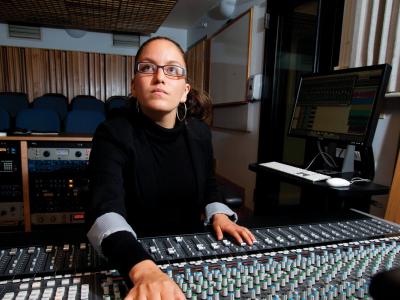What kind of subjects are taught?
Berklee Online offers more than 200 courses in every musical interest area: Everything from instruction on specific instruments (guitar, piano, bass, drums, voice) to music production software (Ableton, Pro Tools, Logic, and more) to larger concepts in music business, songwriting, theory, and composing for film, TV, and games
Do online students receive the benefits of an on-campus Berklee education?
Absolutely! Just like the students studying on Berklee’s Boston campus, Berklee Online students receive instruction from the same world-renowned faculty, with the added benefit of having music industry professionals from around the world teaching as well. You’ll also receive guidance from Berklee-trained Academic Advisors, and have the opportunity to walk at the Commencement ceremony in Boston with your cohort of graduates who studied online and in-person.
Can I upgrade from a lower-level certificate to a higher-level certificate?
Yes! Berklee Online offers two certificate options:
-
CHANGE CERTIFICATE: When a student wants to change their lower-level certificate to a higher-level certificate (or vice versa) prior to the completion of the program. There are no additional fees for this option other than the cost of additional courses, and you will only earn one certificate upon completion.
-
STARTING A NEW CERTIFICATE: When a student wants to earn more than one certificate by having the courses from their lower-level certificate waived into a higher-level certificate. In this case, an additional $175 registration fee is required.
Instructors
Who teaches Berklee Online courses?
Berklee faculty and seasoned professionals teach our courses. Our instructors are recognized experts in their respective fields—they’ve produced and engineered hundreds of artists and numerous award-winning projects, and several of their students have gone on to earn GRAMMY Award nominations.
Financial Aid
Am I eligible for financial aid?
Financial assistance is available for Berklee Online degree programs. This assistance may come from a variety of sources including federal awards, outside scholarships, and private loans.
Federal financial aid is not available for non-degree programs. Non-degree students typically finance their costs out-of-pocket or with a private loan. Review our payment options.
Graduation
What happens if I turn in my graduation application late? Do I still need to apply by December 1 even if I don’t want to walk in the Commencement ceremony?
Because we must coordinate with the Boston campus for Commencement, it is essential that students planning to walk in the ceremony submit their graduation application by 12:00 midnight ET on December 1. If you submit your application late, you will need to wait until the following year to walk.
We ask all students planning to graduate within the current academic year to apply for graduation by December 1, regardless of their plans to participate in Commencement. Late application for students who do not wish to walk will result in processing delays for your academic record and diploma, and your name may not be listed in the ceremony program.
What’s the difference between graduating and walking in Commencement?
Great question! Walking in Commencement and graduating are two separate things.
You can walk in Commencement when you are nine (9) credits or less away from completing your degree requirements by the end of the spring term. Please note: Berklee Online degree students are not required to walk in Commencement in Boston.
You graduate when you have met all of the following criteria:
- Attained at least a 2.70 cumulative GPA in concentrate courses
- Have a minimum cumulative GPA of 2.00
- Fulfilled all program requirements AND completed a minimum of 120 credits for a single major or 165 for a dual major
- Completed a minimum of 60 institutional credits for a single major or 105 institutional credits for a dual major
- Fulfilled all financial obligations to the college
Note Walking across the stage in Commencement
does not mean that you have graduated. You will not officially graduate and receive your diploma until you meet all of the eligibility requirements.
I just finished my last term at Berklee Online! What happens next? Is there anything I need to do?
Congratulations on finishing! If you have already filled out a graduation application, you will want to double-check the "
Graduation Checklist" to ensure you have taken care of all of the various items associated with graduating. If you have not filled out a graduation application, you will need to do that as soon as possible. You will not be able to graduate until we have received and processed your graduation application.
When will I get my diploma?
You will receive your diploma within 6-8 weeks of completing your degree requirements. Please keep in mind that instructors have up to two (2) weeks to submit final grades after the term concludes.
Diplomas are mailed to the address you include on your graduation application. If your mailing address changes after you have submitted your graduation application, be sure to update us at
graduation@online.berklee.edu.
Keep in mind that if you are walking in Commencement, you will not receive your official diploma at the ceremony.
Transfer Credits
Can I find out how many transfer credits I am eligible for before I apply to the degree program?
If you are interested in applying to the Bachelor of Arts degree program and would like an estimate of the amount of transfer credit you would receive, you can request an unofficial transfer evaluation by emailing a copy of your transcript(s) to the Berklee Online Transfer Team at
transfer@online.berklee.edu. Be sure to include your name, major of interest, and any additional questions you may have. You can expect to receive your assessment within 7-10 business days.
I didn’t receive credit on my Official Evaluation for all of the courses that I thought I would. What should I do?
The earlier you contact us with questions or concerns regarding your evaluation, the easier it will be for us to address any issues. Therefore, it is very important when you first receive your official transfer evaluation that you review the information carefully.
If you notice a remaining requirement that you believe you’ve already fulfilled, first consult our document on Common Reasons Credit Does Not Transfer. It’s possible that the course you are thinking of didn’t meet our eligibility requirements.
If none of those exclusions apply, please fill out a Transfer Credit Equivalency Re-evaluation form for the courses you wish to have reconsidered.
Sometimes, we are not able to locate specific information for a course online and we are not able to determine an equivalency, but we are always happy to review additional material which will help us make that determination.
Do my Berklee Online, Berklee campus, or Prior Learning Credit coursework count towards the 60 transfer credit limit?
No, credits completed at Berklee or through the prior learning process do not count towards the 60 transfer credit limit. This maximum is for credit-bearing exams and undergraduate-level coursework completed externally.
What is a credit deficiency and why do I need to make up credit?
Credit deficiencies are caused by transferring a course that is less than three (3) credits to fulfill a three (3) credit Berklee Online requirement. Students with a credit deficiency will be short of the minimum number of credits required to graduate once they have completed their program requirements. In order to be eligible to graduate, you will need to make up the credits you are deficient in.
While the Transfer Team does their best to avoid giving students credit deficiencies, it is not always possible. You can make up the credits you are deficient in by completing additional Berklee Online coursework, by applying for prior learning credit, or by completing additional external coursework in the area in which you are deficient.
Note all external courses will first need to be approved by the Transfer Team.
Can transfer credit fulfill prerequisites?
It depends. Generally, transfer credit cannot be used to fulfill prerequisites unless we determine that the course you completed is a direct equivalent to one of the courses we offer at Berklee Online. Keep in mind that there are some courses which require you to pass a placement exam. For these you will need to achieve a passing grade on the test to fulfill the prerequisite, otherwise you will need to complete the appropriate Berklee Online course.
Can I transfer credits to Berklee Online after I have started the degree program?
Yes, you can. To determine if the coursework you already completed or are considering taking is eligible to fulfill your remaining degree requirements, contact the Transfer Team at
transfer@online.berklee.edu.
I am a Berklee campus student. Can I transfer courses from Berklee Online to my campus-based program?
Are Berklee Online courses transferable to other institutions?
Berklee Online is regionally accredited by the New England Commission of Higher Education (NECHE), the same association that accredits our main campus and other leading academic institutions such as Harvard University and MIT. Our courses are transferable to other institutions, but it's up to the receiving institution to decide the number and types of courses that may transfer. We recommend getting a course pre-approved by an institution before enrolling.
Tuition
How do Berklee Online’s costs compare to other education options?
Berklee Online’s programs have a tuition cost that is approximately 64 percent less than on-campus tuition at Berklee’s Boston campus. Moreover, a recent study revealed that the average annual tuition at for-profit colleges is more than twice as expensive as Berklee Online. Even average annual tuition at other accredited non-profit online universities is roughly $11,000 more expensive than tuition for a year with Berklee Online!
There is a one time $175 registration fee per certificate program. Students may either pay per course term (at the $1,575.00 per credit course cost) or pay in full to receive a 10 percent discount. The registration fee and all courses for the term you wish to begin in must be paid in full in order to begin.
Online undergraduate degree tuition is $59,160 for 120 credits for all majors except the guitar major. Tuition for the guitar major is $63,660. Students taking 10 courses per year can complete the degree in four years at a cost of $14,790 per year. (Note: Tuition and fees are subject to change.)
Online graduate degree tuition is $33,120 for 36 credits. The Master of Music in Music Production and Master of Arts in Music Business programs are designed to be completed in one year of study. Both programs are comprised of 12 three-credit courses that can be taken during four 12-week semesters.
What is included in the cost of a course?
The cost for an individual course includes the tuition fee. The cost of required books, hardware or software must be purchased separately, unless it is stated that these costs are included with your enrollment. Some courses may include additional fees for files or content.


























